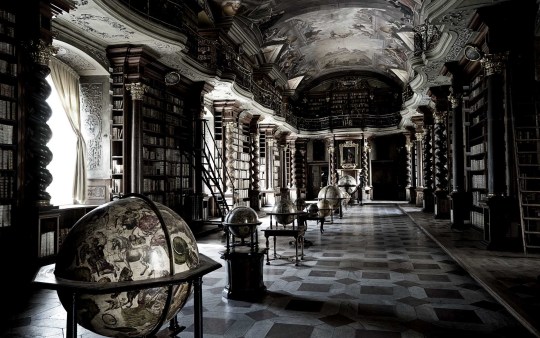Photo
I like the facing placement of the 1001 Nights in Czech

Second hand books are wild books, homeless books; they have come together in vast flocks of variegated feather, and have a charm which the domesticated volumes of the library lack. – Virginia Woolf
6K notes
·
View notes
Text
One generation of Geedists would be enough...
It’s absurd how much I love stuff like this--half-remembered, ephemeral entertainments you somehow glimpsed once as a child. You know that if you ever came to understand them wholly, they’d never live up to what you thought they were in that glimpse. Nowadays we have the ability to track down almost any stray bit of pop culture effluvia--which is great in a way--you no longer have to live in fear you’re missing out on that great band or amazing comic book, and the origin and meaning of any obscure subculture is just a few keywords away. But there’s nothing like a genuine bit of mystery entertainment, and in these days of information overload that’s very hard to come by. Part of me hopes they unearth more of the Land of Ta, but an equal and opposing part of me hopes they never do.
2 notes
·
View notes
Text
New Piece on Medium
Probably against my better judgment I wrote something about the current incarnation of the campus free speech debate.
2 notes
·
View notes
Photo

RIP to Denis Johnson, author of many great books and stories including “the Lagesse of the Sea Maiden.
You can read it in full online or in THE BEST AMERICAN SHORT STORIES 2015.
We’re posting one story every day of Short Story Month. Read all of our short story picks here.
6 notes
·
View notes
Text
An Apology for Idlers
I’ve always felt that idleness, and the daydreaming state in general, get short shrift in our culture, and in humanity in general. It’s hard to mount a principled defense of laziness, especially since it would take some effort, but Robert Louis Stevenson of Treasure Island fame tries admirably.
This may be something that weighs on writers more than others, since the work we do often doesn’t seem like ‘real work’ to other people. ‘Real work,’ and who does it, has always been a tricky political question. It always makes me think of one of my favorite Yeats poems, Adam’s Curse:
“For to articulate sweet sounds together
Is to work harder than all these, and yet
Be thought an idler by the noisy set
Of bankers, schoolmasters, and clergymen
The martyrs call the world.”
0 notes
Text
This is a story of mine I’ve been unable to find a home for. I don’t normally do this, but I’ve decided to post it here, because it seems kind of scarily relevant in a way it wasn’t when I first wrote it:
To the Backers of the New Tongues Anthology of Poetry in Translation
This morning I received a package—a jumbled scree of handwritten notes, in no discernable order, stuffed into a Manila envelope that looked like it had passed through three layers of hell. The handwriting is Allison’s. It is the last word I have received from her, and I am afraid it is the last I ever will…
Forgive me, let me start again.
I owe you an explanation, or at the very least an apology. You have generously shared your support for literature that as I’m sure you know receives far too little attention in the English language, and now it’s my unfortunate duty to inform you that there will be no New Tongues anthology.
As to why that is, well, I will share with you the same information I shared with the police. Perhaps you will be able to make sense of it where they or I could not.
The anthology was to consist of poetry from twelve languages little-read in English, translated by Allison, myself and ten other poets of note, each paired with a native speaker and scholar of her or his nation’s literature. It is a reflection of the high esteem I hold Allison’s abilities as a poet that I chose [redacted] for her. I understand it is somewhat notorious among linguists. It certainly had nothing to do with our history. As for the country itself, I hear it is one of those tiny European principalities whose main industry is serving as a tax shelter.
The thing is, I know I did research when planning New Tongues, but I can hardly recall anything about [redacted]. I can’t even seem to find it on a map.
For weeks, my messages went unreturned. When I came to her apartment, no one would answer the door. Then I received the notes.
I have tried my best to put them into readable order, and to take other precautions I hesitate to believe are necessary, yet which I cannot also bring myself to do without:
--M
…just my luck this ‘Mr. Note’ lives miles from the nearest subway, in a part of Brooklyn that’s all dingy old townhouses like rows of molars. It’s the kind of place you can’t tell is safe or not from first glance because it’s so quiet, like a De Chirico painting with uglier buildings – a blank street that could be anywhere in the world.
What kind of a name is ‘Mr. Note,’ anyway? Is he English? I thought I was supposed to be working with a native [redacted] speaker. Then again, I wouldn’t put it past Malcolm to beg me to participate in his little project, then give me an assignment designed to make him look good by comparison. Good one, Mal.
I feel compelled to point out the falsity of this. I chose [redacted] for Allison because she is the greatest poet I know. The past is dead, and I harbor no more hard feelings. -M
Mr. Note’s building looks just like all the others – four units each, with buzzers by the door. His just says ‘NOTE,’ an imperative sandwiched between three other names whose ethnicity I can’t determine. Maybe we’ll hit it off and he’ll let me call him by his first name. Maybe it’s ‘PostIt.’
“Who are you?” his voice crackles in the speaker, old and gruff. What kind of accent is that? I can’t place it.
“Allison Mandel, the poet, from the anthology.”
“The what?”
“New Tongues, the poetry anthology.”
“New tongues adorn the palace gates. They blacken in the sun.”
The speaker dies in a burst of static.
A few moments later, the door unlocks with a buzz like angry wasps…
“You are a poet?” His first words are a brusque question, as if he cannot believe what he sees.
I grimace, bracing myself for a fresh pile of old world macho bullshit. I’ve heard it all before; all the bitter, fungal professors that see your mere existence as a desecration of their favorite literary corpse-host. Every university seems to sprout at least one.
Watching Allie lay into a pompous Pound scholar at a faculty luncheon is among my most cherished memories of our time together. -M
Cable news is on a constant drone in the background. Oh lord, Mr. Note is some kind of political nutjob.
Then something in his pinched little face softens, and I think, it’s not that, it’s something else. He’s small, no taller than my shoulder, and stooped. His skin is etched everywhere by age, creased and blotched. Only his hair could be called beautiful, fine and almost pure white – so delicate it is like the ghost of hair.
“Forgive me,” he says. “It is only that poetry means something different in our language.”
Well, I have my work cut out for me.
Most good translations are the work of a poet and a scholar – and both will tell you good translations are impossible. Classical Chinese poems, for example, gain significance by their characters’ lateral as well as vertical arrangement – a web of meaning we can’t echo in English. Languages have different tenses and thus different views of time. Vestigial lumps in one tongue are the beating hearts of others. If you keep at it long enough, you start to think we’re not all living in the same world.
I brought a copy of Bridal Flats with me in case Mr. Note wanted to read my work. He stares at it, confused, through little half-spectacles, as if I have handed him a pinned insect. At his shirt cuff I can see the blue-black lines of a tattoo that must creep further up his arm. I wouldn’t have picked him as the tattoo type.
He smiles as he reads my collection, real delight showing in his face, and I feel bad for my early appraisals of him. Then he seems to remember something troubling – I can almost see the other shoe dropping in his brain. His face sags into a frown.
“This will not work. It is a terrible idea,” he says.
I swallow all the things I want to say to him. Instead I point to the table.
“Show me. Teach me about your poetry.”
He laughs, short and bitter, but he obliges me.
We open a musty old book in his language. The alphabet is Latin, but the words are flecked with accents and strange marks I can’t guess the significance of. Neither my fluent French nor my smattering of German is of any use. Not a single word evokes anything familiar. I cannot even imagine the pronunciation.
“What do you know of [redacted]?” he asks.
“Nothing.”
“I am not surprised. We are so small, and ours is an orphan tongue, with less family than even Finnish, Hungarian or Basque.”
He hands me a battered spiral notebook.
“These are some transliterations I began. In [redacted] the originals have a rhyme and meter which is quite complex.”
I am surprised he has done even this much—he seems so opposed to the project, but I think I can see a glimmer of desire as he watches me read over his rough, literal translations. Some secret part of him has wanted this very much.
“The apple has a radius of
1.9 inches. It is light red,
The variety known as Gala….”
Here I picture the perfect, questioning arch of Allison’s eyebrow, the subtle narrowing of the opposite emerald eye. A look I knew well... -M
“What’s the significance of this?” I ask him. “Are they big fans of William Carlos Williams in [redacted]?”
“The apple is something real. Something on which to hold in troubled times. It is… safe. Read another.”
“There are precisely 740 steps
In the National Stadium, provided
Of course you do not neglect to
Count the two emergency stairs,
Which many often do.”
He nods at this, though he winces slightly at the words ‘National Stadium.’ What kind of government does [redacted] have, anyway? I remember Malcolm saying it was one of those little countries that never bothered to abolish the monarchy.
Something on the TV sets Mr. Note off, and we turn away from the book. On the screen one of those dictators the West pretends is not a dictator because of favorable trade agreements is addressing the UN. Nothing to do with [redacted], as far as I can tell, but Mr. Note is engrossed, shifting as he watches between anger and an acid, hopeless humor.
“Kim Jong Un spends millions to bring basketball stars to his birthday parties while his people starve. They say his father forced them to listen to him sing rock and roll songs, dressed as Elvis Presley. Saparmurat Niyazov of Turkmenistan erected a golden statue of himself that rotated so as to always face the sun. Moammar Qadafi, before he was deposed, was guarded always by a harem of warrior women. There are stranger things, worse things. You do not understand, here, what it is like. An absolute ruler styles himself a father to his people, when in fact the opposite is true. He is a child, and nothing is so terrifying as to be ruled by the cruel whim of a child. You want to laugh, but heaven help you if you do.”
He speaks these words in anger. Then, after they have escaped his lips, he grows pale and looks around the room nervously. When he sees nothing out of the ordinary, he smiles.
“Let us read another.”
He leans over the notebook. I can see the lines of the tattoo peeking out of his collar, creeping up his neck. It’s strange, but they almost seem to be moving—little drops of blue-black blood flowing in reverse.
He lets me take his notebook home with me to read. I confess I’m surprised by the trust. He was happy when I left; smiling like a little boy who’s just founded the world’s greatest and most secret club. I’m glad at least one girl was allowed.
It’s raining outside, and the streetlights make the drops of water on my windows into little flecks of light. Inside my apartment is small and empty. I remind myself I can get a pet of some sort anytime I want to. I can leave all my clothes in a big pile in the middle of the room. I can paint the walls whatever stomach-churning color I desire. Malcolm is gone. Why, after two and a half years, does it still feel like he’s looking over my shoulder?
I’m sure I was hard to live with. I don’t pretend otherwise, but if only-
No, I have run out of words on this subject. Perhaps if I had listened and kept my mouth shut more often, the past would have been different. -M
I stare at Mr. Note’s precise, blocky handwriting, trying to imagine what the poems of [redacted] sound like in their native rhythm. On the page they seem constructed to be as flat and dead as possible – a poetry of the mundane. According to his notes these go back hundreds of years, unchanged. When everyone else was writing dense, metaphorical sonnets, the poets of [redacted] were talking about the ideal type of wood for barrel construction. They were either modern way before it was cool or else the world’s most boring culture.
The square of [redacted] contains
34,000 bricks, and a fountain…
And that sort of thing.
In the town of [redacted] they grow
Barley, and their little lives rise and
Are cut down like stalks of grain
Beneath their master’s scythe…
That’s odd… I was trying to copy a poem in Mr. Note’s manuscript that was all about agriculture in [redacted]—I don’t know what made me write those creepy lines. Looking back at the original, they’re not there. It’s all about the yearly size of barley crops.
Reading too many of these poems must be numbing my brain. I’m spending more time staring at my desk than reading. Stupid Malcolm, I bet he did this on purpose. Anything to look good in his own anthology.
Then, as I stare at the wood of the old desk, I see something… a face. Funny I never noticed it before, it’s uncanny—not just jumbles of lines that look kind of like eyes and a mouth, it’s an unmistakable face. It’s simple, abstract, but every time I look at it I see something more. The mouth and nose are an impassive mask, but the eyes… I can’t believe what I’m looking at is just the grain of cheap wood. I have never seen eyes so hard or so cruel… I quickly look away, back to the book—only all the poems have changed. I can barely bring myself to scan the words. Everything is blood and death. The square is lined with crow cages, the palace walls with severed heads. New tongues adorn the palace gates.,,
I have to leave the room after that.
The next morning, yup, nothing but the plain old wooden desktop, with two knots in the wood grain that might have been those eyes that freaked me out so much. The poems are all as boring as I remember them. Am I becoming one of those people who sees the risen Christ on a piece of toast? Way to go, Allie. Malcolm would swoop in here with the word pareidolia, then explain that it means the human tendency to see patterns and images in random nature, even after I tell him yes, I know what it means.
Of this I am certainly guilty. -M
But I can’t forget seeing those eyes… It’s crazy, I know, but some part of me thinks they saw me too.
I try to start planning for the fall semester, maybe even start on a new poem, but I can’t. Whenever I sit down to write I see those eyes. The only words that come to me are the ones I saw in the changed notebook, all blood and power and madness. What’s going on here? What was Malcolm thinking, giving me this?
This afternoon I ring Mr. Note’s buzzer until he opens the gate and keep it ringing a few seconds longer for good measure. I’m furious and still shaking from last night. This is too damn weird. He looks happy to see me at first. His smile crumbles when he sees the look on my face.
“What is going on here?”
He stays silent; his face drained of color. At least he doesn’t pretend not to know.
“What is the big secret with these poems? What’s your real name, anyway?”
“Names are not given lightly where I’m from.”
“Are you a refugee or something?”
“To be that, I would have to believe in refuge.”
“Ok, this isn’t going to work unless you tell me some things. Who or what is the prince of-“
“Do not say it!”
His face is white, his body trembling. He is feeble, a dry old leaf, but his hand reaches out to grip my arm, and his fingers close with a desperate, shocking strength. The blue-black lines of his tattoo stand out like fresh wounds.
He starts to talk.
“Once, perhaps we were like other places. We knew history. We knew the freedom of our own language. His poets changed past and present, meaning slipped away from the words we used, replaced with things we did not feel in our hearts. Now he has always been there, and always will be. He leaves nothing pure, seeping into every corner of our lives. With a few strokes of the pen, so much is gone. People are gone. You never see them again. He has eyes everywhere, hounds trained for the hunting of men, and traitors hang from his palace wall. You have already seen too much.”
“Don’t worry. Take your notebook back,” I said. “I’m done.”
I practically throw it at him. I don’t need this in my life. He lets it drop to the floor.
“It was foolish to want this,” he says. “Forgive me.”
As I turn away he stoops to pick it up. The ink from his tattoo has crept down his hand and on to the page, its blue-black tracery spreading across the papers he is holding. Something is putting down roots… I do not stay to watch. I cannot.
My walk home is silent, and I fight to keep from breaking into a run. The first chill of fall is in the air, and the sky looks like it could rain on a whim and stop a moment later. Everything is gray and waiting. I met a Czech poet once, one of the samizdat guys, who said there were always two types of secret police – the ones everyone knew were secret police, there to remind you, and the ones no one knew were secret police, there to deal with you.
Oldřich—I always hated the way he looked at you. -M
I keep my eyes on the street on the way back, try not to meet anyone’s gaze, and when I get home, I lock and bolt the door and collapse against it, breathing heavy.
For a moment, I almost consider calling Malcolm. Luckily, that foolishness passes quickly.
I wish you had. Oh Allie, what happened to us? What happened to you? -M
In my dream, I am in a dark place. I have forgotten the light. I know myself by feel, but the face I touch does not feel like mine, nor do the hands that touch it. My body is no longer related to itself, its parts are discrete, unknowing. Mr. Note’s voice is in my ear:
“The worst thing is how easily it happens. The people are willing to believe, to do whatever is asked of them. You must merely present it as normal, as the logical choice, and it has always been thus.”
Then there is light—ghastly, painful, and white corridors, and hands on me, washing me, a mirror. Is that really my face? So thin, so lost. There is a humming by my arm, and a burn as I feel the first bite of the electric needle, see the blossom of blue-black ink on my flesh, the lines that are taking shape… words, volumes I dare not read are scrawled on my skin.
[redacted]
[redacted] [redacted] [redacted] [redacted] [redacted] [redacted] [redacted] [redacted] [redacted] [redacted] [redacted] [redacted] [redacted] [redacted] [redacted] [redacted] [redacted] [redacted] [redacted] [redacted] [redacted] [redacted] [redacted] [redacted]
I will not leave the apartment. When my phone rings, it is all clicks and whispers, the whirr of listening machines. I have unplugged it from the wall. When I creep out to get my mail I find it has been opened.
I will not leave the apartment, but I can’t stop thinking of Mr. Note, the last look of sadness giving way to terror on his face as the blue-black lines spread from his hand to the pages he held. One day I cannot stand it anymore, and I take the subway, then the bus, then walk to where he lives. I know I am followed every step, though I see no one. When I get there, I find another name on the entrance to the building. I ring the buzzer, and a woman answers, speaking a language I cannot recognize. I speak into the box, asking about Mr. Note, but there is no response.
The new semester will be starting soon. I have already missed two faculty meetings. I don’t know what I will do once classes start. It’s been days since I’ve written, and I’m too afraid to read even the newspaper. I know what words I’ll find there.
My chair is heavy wood, old, scarred and pitted and stained-over many times. It was purchased at a yard sale. My desk- no, don’t look at the desk. The eyes. The face. My apartment is about 600 square feet, pre-war, with off-white plaster walls. My walls are lined with bookshelves, some dark wood, some that cheap wood-composite stuff you get at IKEA, a mix of plastic and organic. My books are the only thing I really keep organized, alphabetical by author, poetry and fiction and theory and general nonfiction. The titles are all familiar and dear to me. The Complete Works of Emily Dickinson, Millay, the Rossetti’s, Elizabeth Bishop, Lyrical Ballads, Self Portrait in a Convex Mirror, Four Quartets, Les Fleurs du Mal, The Glory of the Ruler, The Exalted Prince of [redacted], the baying of the hounds, the heads of traitors hung from his walls, wreathed in flies. New verses are writ each day in his honor. New tongues adorn the palace gates, they blacken in the sun.
That’s the end. But there is more, or there was. When I read these notes the first time, there was a poem in ink on the back of the last page, a true translation. I confess it chilled my blood. It is gone now, and I would not reproduce it here even if I could. Allison is gone with it. Not even a trace remains.
It is seventy-five steps from my office to my car. The sun is setting. The parking lot is empty, but I know I am followed all the same.
1 note
·
View note
Text
Trying my hand at Medium
I’ve had some ideas for longer essay type things, so I decided to try putting them on Medium. Here’s my first post, on the dangerous lure of simplicity.
0 notes
Text
Music Mondays: R.E.M.-It’s the End of the World As We Know It

I’m writing this shortly before what may be the most consequential election of my life, so I felt the song choice was inevitable. I sincerely hope people choose sanity, imperfect though it may be, over the reality-TV scam artist authoritarian train wreck threatening to make a gilded toilet of our democracy, but enough about that for right now.
I want to talk about what this song always makes me think of, which thankfully has nothing to do with politics. Twice in my life, when I was twelve and sixteen, I attended a summer program for “gifted” kids called Center for Talented Youth. It’s run out of John’s Hopkins University, but they offer summer courses for nerdy kids at colleges all over at least the East Coast. I qualified for the program in reading and writing, but not math, and even in this camp of misfits I was always a little out of step with the rest of the kids—merely middle class as opposed to upper-middle, with parents that happened into their careers because they had to do something, and felt it was probably all right if I majored in English and let things sort themselves out. But this camp was an awkward, nerdy family all the same—a place where inventing made-up languages, or painting your sneakers crazy colors, or writing sonnets made you, if not cool, then at least not a target.
The CTY program was three weeks, but it seemed to last forever. Every Saturday there was a dance, and you can probably imagine the kind of awkward hormonal outpouring it was. CTY has its own musical canon, which the kids defend more zealously than any academic classics department. Certain songs, some of which were popular when the program started, and others which were added along the way—must be played at every dance, some at appropriate times, at the risk of a nerd riot. Each dance ends with awkward slow dancing to “Stairway to Heaven,” followed by everyone linking arms and singing along (and sometimes interpretive dancing) to Don McLean’s “American Pie.” CTY was the first place I heard They Might Be Giants, and New Order, and any number of other bands. I had already heard REM—this being the time MTV actually played what we then called alternative music—but it never meant so much to me as then, all of us frantically moshing across the dance floor, insecurity forgotten.
I didn’t know who Lenny Bruce or Lester Bangs were yet (or, for that matter, Leonard Bernstein and Leonid Brezhnev), but the song’s frenetic pace and gonzo lyrics always appealed to me. Even then I think I liked that it was somehow impenetrable, and not a lame list of historical facts like “We Didn’t Start the Fire.” Lots of things can feel like the end of the world when you’re sixteen, including the end of a three week summer nerd camp. Back then I was just pretending I felt fine, instead of admitting how broken up I was over the loss of the intense friendships I’d managed to build in such a short time and the girls I had heartrending teenage crushes on.
Right now, I’ll have to wait until Wednesday morning to tell you how I feel. At the moment, it’s definitely not fine.
Image credit: Stark (Stefano Andreoli)
0 notes
Text
Scary Stuff
In honor of Halloween, I wanted to share some of the things that have honestly frightened me. I’m thinking of the kind of thrilling fear that goes beyond a jump-scare, or an “oh, cool, you had me for a minute there,” feeling, but stops short of being actually traumatic. The kind of fear that leaves you checking the locks on the doors and hoping you don’t dream, but feeling unmistakably, uniquely alive.
In those terms, the scariest movie for me was The Ring, the American remake of Ringu (remakes aren’t cool, I know. This one was actually good). It’s a pretty perfect combination of the familiar and the unexplained, unfolding first like a campfire story, then like a nightmare, then like something beyond even that.
(If we’re counting childhood, then the fun, dark, creepy but cute comedy Gremlins is actually a terrifying ordeal leading to a series of recurring nightmares).
The scariest individual movie scene for me belongs to Mulholland Drive. If you’ve seen it, you probably know the one I’m talking about, behind the diner. David Lynch more than any other director has really mastered the feeling of nightmarish inevitability--it literally feels like he’s pulling you somewhere you don’t want to go. (”We’ve met before. At your house, In fact, I’m there right now, call me...” from Lost Highway is an honorable mention).
The scariest album I’ve ever heard is probably Tom Waits’ Alice.
Just about anything I’ve read by Caitlin R. Kiernan is great, but she’s written both one of the scariest books I’ve ever read, The Red Tree, and one of the scariest stories I’ve ever read, “The Prayer of Ninety Cats.” I think she writes the feeling of dreaming better than anyone I’ve ever read, and she’s unparalleled in her use of just enough of the unexplained and inexplicable.
Some other stories that have really gotten to me are “Casting the Runes” by M.R. James (seriously, all his stories are great, but this one might be the creepiest--his stories feel like classic ghost stories, but they’re more physically immediate and more bizarre at the same time); and “The Yellow Sign” by Robert W. Chambers, which shows its age but it’s melodramatic aspects actually work really well with the creepiness. “Best New Horror” by Joe Hill manages to be scary even as a work of meta-fiction, which is hard to do (Mark Samuels is also a master of this). “The Ball Room” by China Mieville (who I’m a huge fan of in general), Emma Bircham and Max Schaefer is a great example of an M.R. James-style ghost story in a modern setting--I’ll never look at Ikea or Chuck E Cheese the same way again.
There are too many horror stories I love to mention here, but actually most don’t give me this sort of fright--the reaction they usually elicit from me is, “wow, cool.” (a lot of horror greats, like Stephen King and H.P. Lovecraft, are in this category for me). I do want to mention one other standout, though--an author who’s the master of evoking a feeling I’d call parallel to terror--Thomas Ligotti. His stories carry such a feeling of cold loneliness and anhedonia that I can only read a few at a time. They’re brilliant, but probably not for everyone. He can also be wickedly funny, though--no one skewers the modern workplace quite like a philosophical pessimist.
Finally, a few real-world fears.
When I was a kid, we used to go to the Baltimore Aquarium fairly often. It’s not that far of a drive from the DC suburb where I grew up. About halfway through the aquarium there were large pictures of various deep sea fish--I think an anglerfish and a viperfish. They scared the bejeezus out of me--dark, empty eyes, long needle teeth, existing in total darkness... I mean, of course they did. And there’s something about the anglerfish, too--that little globe of light at the end of its stalk must be so beautifully fascinating to the prey it attracts, only to lead to that gaping mouth. Nature isn’t evil, it’s just nature, but that always makes me wonder.
A few years ago I went back and saw those pictures weren’t there anymore. I wonder how many parents complained.
Finally, my worst fear of all is probably having someone that I love just vanish without a trace. Funny enough, there’s a great film which deals with exactly this, The Vanishing (the original Dutch film, not the remake this time). It’s a very well made film, dealing with one of my worst fears, and yet for some reason it didn’t really scare me that much. Life is funny that way.
Happy Halloween!
0 notes
Photo
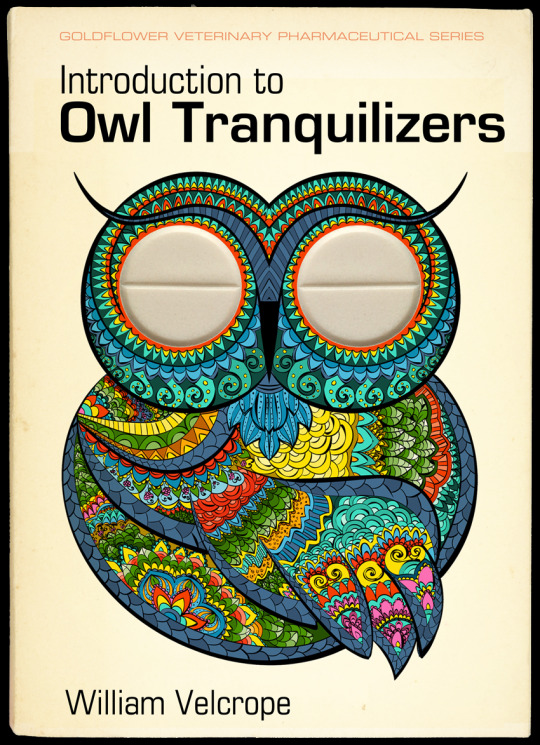
Introduction to Owl Tranquilzers by William Velcrope (1975)
2K notes
·
View notes
Text
The (Unexpected) Uses of Literature
”I kind of love the NYT’s “Letter of Recommendation” features--even when they focus on something I’m not really interested in, they offer a little window into someone else’s brain by showing us what they value, while at the same time explaining something you might have never even known was out there.
This entry from April, 2016, “The Rabbit Who Wants to Fall Asleep” is a special case, though. I’ve always been fascinated by what books and the act of reading can do, especially beyond the usual reasons we read--entertainment and/or artistic pleasure. “The Rabbit Who Wants to Fall Asleep” sounds like something altogether different--not attempting to induce sleep through an entertaining story that helps the mind wind down, but actually trying to induce it like a magic spell. It makes me think of The Entertainment from Infinite Jest, or Monty Python’s deadly joke. Reading is already a kind of guided self-hypnosis, it’s interesting to see it put to such a practical purpose (one that, if my friends with young children are anything to go on, is very necessary).
0 notes
Photo
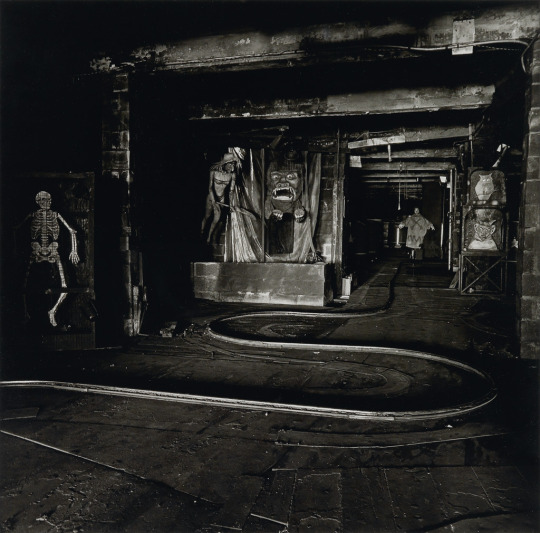
Diane Arbus, The House of Horrors, Coney Island, 1978.
3K notes
·
View notes
Photo
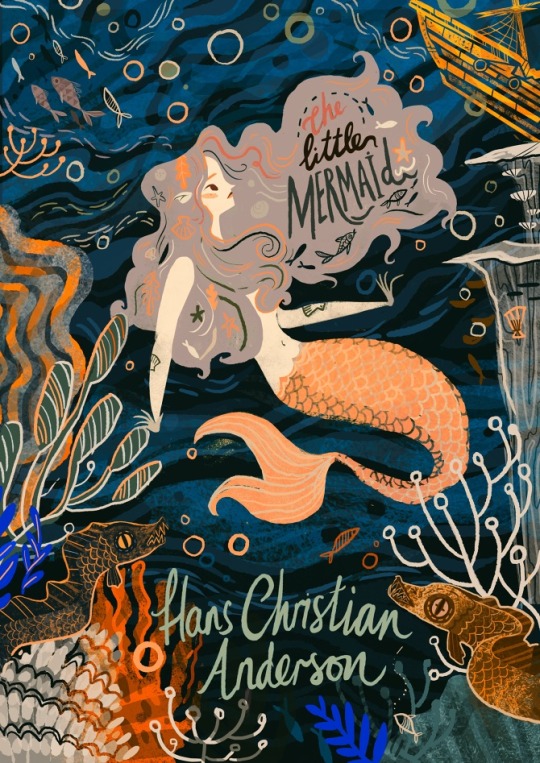
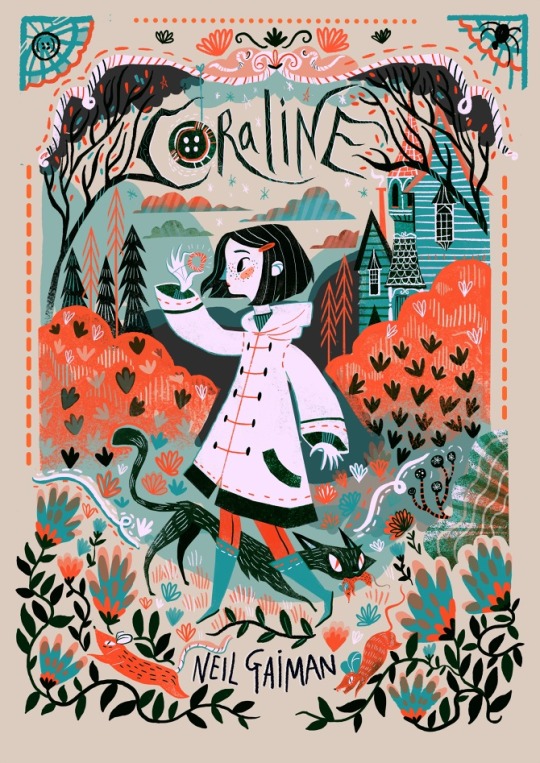
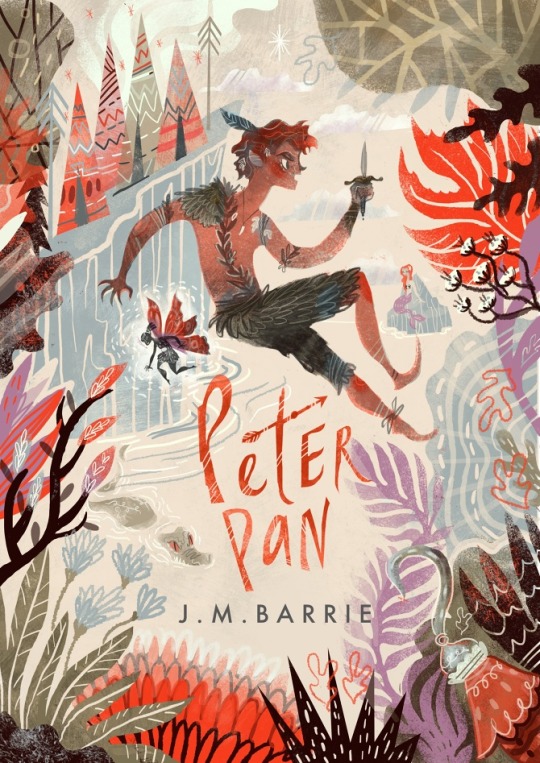

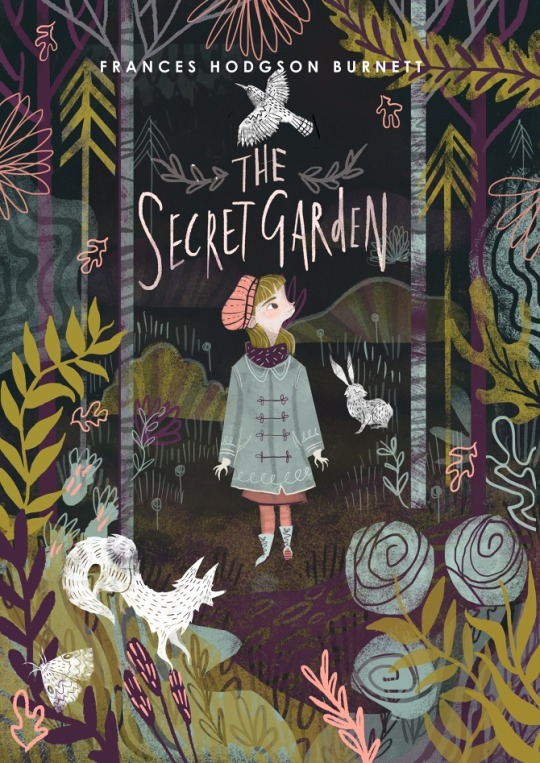
Book Covers by Karl James Mountford
website l instagram l tumblr l shop
37K notes
·
View notes

